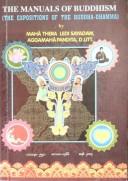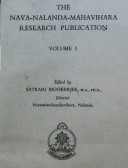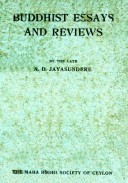Tìm Sách
Sách tiếng Anh-English >> The Manuals of Buddhism
Thông tin tra cứu
- Tên sách : The Manuals of Buddhism
- Tác giả : Maha Thera Ledi Sayadaw
- Dịch giả :
- Ngôn ngữ : Anh
- Số trang : 714
- Nhà xuất bản : Myanmar, Mother Ayearaddy publishing house
- Năm xuất bản : 2004
- Phân loại : Sách tiếng Anh-English
- MCB : 12100000011632
- OPAC :
- Tóm tắt :
CONTENTS
The most Venerable Mahãthera Ledi Sayadaw
The English Translations
The Venerable Mahathera Ledi Sayadaw
Ledi Dipam Propagation Society
Contents………………xi
Donors of this Dhamma Gift
The Vipassanã-Dipani
The Three Vipallãsa
The Three Mannanã
The Two Abhinivesa
The Two Bhũmi or Stages
The Two Gati
Nakhasikha-Sutta
Kãnakacchapa-Sutta
The Two Sacca or The Two Truths
Twenty-Eight Kinds of Material Phenomena
Fifty-Four Kinds of Mental Phenomena
Consciousness
Fifty-Two Kinds of Cetasika
Nibbana
The Four Mahãbhũta or The Four Great Essentials
The Six Bases
The Two Bhava or Sexes
Jivita-Rupa or the Material Quality of Life
Ãhàra-Rũpa or The Material Quality of Nutrition
Gocara-Rũpa or The Four Sense-Fieldsũ
Akàsa-Dhatu or The Material Quality of Limitation
The Two Vinnatti-Rupa or Modes of Communications
The Three Vikãra-Rũpa or The Three Plasticities
The Four Lakkhana-Rũpa or the Four Salient Features
The Four Producers or Generators of Material Phenomena
Causes or Origins
The Two Abhinnàna or The Two Super-Knowledge
The Three Parinna
Exposition of Tirana-Parinĩiã
Pahãna-Parinnã
Patthanuddesa Dipani
Hetu-Paccaya or The Relation by Way of Root
Ãrammana-Paccaya or The Relation of Object
Adhipati-Paccaya or The Relation of Dominance
Anantara Paccaya or The Relation of Contiguity
Samanantara-Paccaya or The Relation of Immediate Contiguity
Sahajata-Paccaya or The Relation of Co-Existence
Annamanna-Paccaya or The Relation of Reciprocity
Nissaya-Paccaya or The Relation of Dependence
Upanissaya-Paccaya or The Relation of Sufficing Condition
Purejata-Paccaya or The Relation of Pre-Existence
Pacchajata-Paccaya or The Relation of Post-Existence
Ãsevana-Paccaya or The Relation of Habitual Recurrenc
Kamma-Paccaya or The Relation of Kamma
Vipãka-Paccaya or The Relation of Effec
Ãhãra-Paccaya or The Relation of Food
Indriya-Paccaya or The Relation of Control
Jhana-Paccaya or The Relation of Jhana
Magga-Paccaya or The Relation of Path
Sampayutta-Paccaya or The Relation of Association
Vippayutta-Paccaya or The Relation of Dissociation
Atthi-Paccaya or The Relation of Presence
Paccaya-Sabhãgo or The Synthesis of Relations
The Synchrony of Relations
Synchrony of Relations in Consciousness Not Accompanied by Hetu
Synchrony of Relations in the Immoral Class of Consciousness
Synchrony of Relations in the States of Mind
Synchrony of Relations in the Groups of Material Qualities
Sammaditthĩ Dipani
Part I. Three Kinds of Wrong Views
Refutation of Pubbekata-Hetu View
Refutation of Issaranimmãna View
Refutation of Ahetuka View
Three Wrong Views
Refutation of Pubbekata-Hetu View
Exposition of the World—’Kammassakà’
Three Great Spheres
Exposition of ‘Kammassaka, etc.
Part II. Refutation of Issaranimmana View
Refutation of Ahetuka View
Further Explanation of Kammassakata-Vãda
Exposition of Atta-Ditthi
Benefits Derived From Total Destruction of Atta Ditthi
Part III. Atta and Anatta
Pictorial Ideas and Concept of Continuity
Asãmikatthena-Anatta
Avasavattanatthena- Anattã
Brief Exposition of Attaniya
Five Kinds of Sammã-Ditthi
Example of an Iron Bowl
How to Acquire Nảma-Rũpa-Pariggaha-Nâna
How to Attain Insight-Wisdom
Niyama Dipani
Of the Fivefold Niyãma (Cosmic Order)
- Of the Two Standards of Truth
III. Expositions of Great Periods of Time
- Of Things Not Within the Range of Thought
- Expositions of the Three Worlds
- Expositions of Causal Genesis
Dhamma-Niyãma (a discussion)
Note on Dhamma-Niyama
Catusacca-Dipani
Part One
The Twelve Ãyatana (bases)
Eighteen Psycho-Physical Elements
The Meaning of Characteristics of Truths
The Burden of Dukkha in the Brahma World
The Burden of Dukkha in Deva World
The Burden of Dukkha in the Human World
The Burden of Dukkha in the Lower Planes
How Beings Have to Wander in the Round of Rebirths
Part Two
The Exposition of the Meaning of Samudaya-Sacca
The Four Interpretations of Magga-Saccã
Bodhipakkhiya Dipani
Translator’s Preface
Three Types of Individuals
Necessary Conditions of Practice for Neyya and Padaparama
Two Classes of Individuals
Vijja (Knowledge) and Carina (Conduct)
The Essential Point
Order of Practice and Those Who Await the Next Buddha
Loss of Opportunity to Attain the Seed of Vijja Through Ignorance of the Vale of the Present Times
Adhikãra (Assiduous and Successful Practice)
Dhammantarãya
- The Bodhipakkhiya Dhamma
- The Four Satỉpatthãna
III. The Four Sammappadhãna
- The Four Iddhipãdã
- The Five Indriya
- The Five Bala (or Balảni)
VII. The Seven Sambojjhanga
VIII. The Eight Magganga
- How to Practise the Bodhipakkhiya-Dhamma
- Heritage of the Sãsanã
Maggariga Dipani
Samma-Ditthi
Kammassakatã-Sarnrnã-Ditthi
Samrna-Sarikappa
Sammã-Vaca
Sammả-Kammanta
Sammã-Ãjiva
Sammã-Vãyama
Sammã-Sati
Sammã-Samãdhi
Exposition of the Three Kinds of Sammã-Ditthi
Analysis of the Good and Bad Kamma
The Result of Present Kamma
The Result of Past Kamma
Sabbe Sattã Kammassakã
Sabbe Sattã Kammayonì
Sabbe Sattã Kammabandhủ
Sabbe Sattã Kammappatisaranã
Exposition on Dasavatthuka Sammã-Ditthi
The Exposition of Right Understanding of The Four Noble Truths
Right Understanding of The Truth About Suffering
Oppression Through Kamma Activities
Oppression Through Instability
Oppression Through Ill of Suffering
Oppression Through Burning
Right Understanding of The Truth About the Cause of Suffering
Right Understanding of The Truth About the Cessation of Suffering
Right Understanding of The Truth About the Real Path Leading to the Cessation of Suffering
The Exposition of Right Thinking
The Exposition of Right Speech
The Exposition of Right Action
The Exposition of Right Livelihood
The Exposition of Right Effort
The Exposition of Right Mindfulness
Four Applications of Mindfulness
The Exposition of Right Concentration
Three Kinds of Vatta
Interrelations Between Magganga and Vatta
The First, Second and Third Stage of Ditthi (Wrong Views)
I-ness
To the First Nibbana
Match-Box, Match-Stick and Nitrous Surface
Forming the Noble Eightfold Path into Three Groups
To Destroy the Three Stages of Sakkaya-Ditthi
How to Establish the Morality-Group of the Eightfold Path
How to Take and Practise Ajivatthamaka Sila
The Kinds of Nicca-Silã (Permanent Morality)
Ingredients of the Seven Kinds of Wrong Doing
How to Establish the Concentration-Group of the Noble Eightfold Path
Anãpãna Practice
Let Mindfulness Be Constant
How Mental Restlessness Can Be Got Rid of
When to Establish Pannakkhandha (Wisdom-Group)
How to Establish the Wisdom-Group of the Eightfold Path
‘Increase’—Udaya; ‘Decrease’—Vaya
Anicca, Dukkfca, Anatta
Sakkãya-Dỉtthi’ And the Head
Know: Note: Think: See:
Delusion
Because They Do Not Understand
Must Be Persistent
To Become ‘Bon-Sin-San’ Individuals
A Short Explanation of the Establishment of the Noble Eightfold Path
Understanding Reality Whenever Contemplated
Enjoying the Three Kinds of Happiness
Alin-Kyan
Five Kinds of Stark Ignorance and Five Kinds of Light
Kamma-Sammoha and Kammassakatãnảna
Not Understanding Kamma
Not Understanding the Resultant of Kamraa
Kammassakatã-Nảna
Understanding Ramma and Its Resultant
The Light of the World
Stark Ignorance of Dhamma and the Second Light
Dhamma-Vavatthảna-Nãna
Stark Ignorance of Causation and the Third Light
Stark Ignorance of Three Characteristics of Life and the Fourth Light
Nibbảna-Pativedha-Nãna
Six Kinds of Datu (Elements)
Analysis of Pathavi
Proof by Means of Characteristics
Ana]ysis rá Ãpo
Analysis of Tejo
4391 Uttamapurisa Dipani
Chapter One
The Perfections Defined
The Perfections Explained
Chapter two
Seven Aspects of Materiality to be Perceived
Seven Aspects of Feeling to be Perceived
Seven Aspects of Perception to be Perceived
Seven Aspects of Mental Formations to be Perceived
Seven Aspects of Consciousness to be Perceived
The Origin and Cessation of Mind-consciousness
The Satisfaction and Danger of the Four Mental Aggregates
The Danger of Impermanence in the Five Aggregates
The Five Aggregates and the Four Noble Truths
Chapter Three
The Element of Deliverance
The True Peace of Nibbana
Chapter Four
Two Types of Person
Chapter Five
How to be Mindful of the Noble Truths, etc.
While Doing a Meritorious Deed
Chapter Six
The Five Maras
Chapter Seven
How to Practise the Three Refuges
Chapter Eight
The Four Types of True Buddhists
Chapter Nine
The Four Noble Truths Need to be Understood
Some Difficult Points in Dependent Origination
The Four Noble Truths Explained
Chapter Ten
An Exhortation Regarding the Greatest of Opportunities
Anãpãna Dipani
Request and Acceptance
Exhortation to Practise and Strive for Spiritual Success
Drift in Past Samsãra Because of Unstable Mind
Mindfulness of the Body before Tranquillity and Insight
Why Mindfulness of Breathing Should Be Practised
Mindfulness of Breathing Leads to Nibbãna
Posture for Meditation
The First Tetrad
The Method of the Commentary
The Commentary Reconciled with the Sutta
The Second Tetrad
The Third Tetrad
The Fourth Tetrad
How the Foundations of Mindfulness are Fulfilled
How the Enlightenment Factors are Fulfilled
How the knowledge and Deliverance are Fulfilled
How to Proceed to Vipassana
Conclusion
Appendix
I. Five Questions on Kamma
II. Anattanisamsa – A Concise Description of the Advantages
Arising out of the Realisation of Anatta
III. Tikas, Manuals, Essays, and Letters of the Venerable
Ledi Sayadaw &nb sp;
 Facebook
Facebook
 Google
Google
 Google+
Google+


















